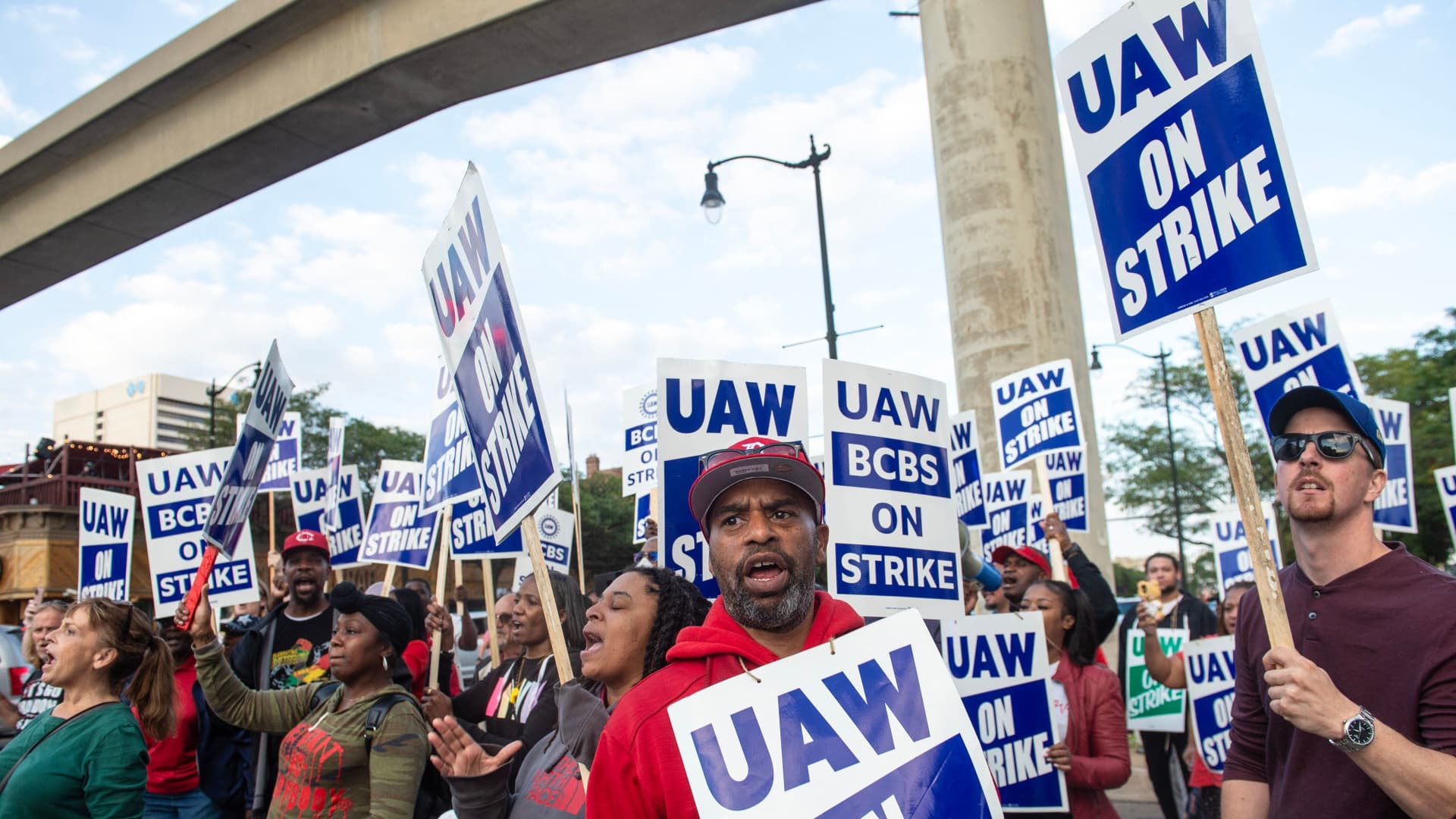United Auto Workers members have overwhelmingly authorized a strike against General Motors, Ford Motor, and Stellantis during ongoing contract negotiations, with an average of 97% of members supporting the action, although the final votes are still being counted.
The demands of the United Auto Workers (UAW) union, including higher pay, shorter work hours, and the restoration of pensions, could lead to a strike against General Motors, Stellantis, and Ford as the automakers refuse to meet these demands, potentially raising already-inflated vehicle prices.
The United Auto Workers union representing workers at the Big 3 U.S. automakers is demanding a four-day workweek at full-time pay, a 46% wage increase, and a share of company profits, threatening to strike if an agreement is not reached by September 14.
Approximately 146,000 U.S. auto workers are poised to go on strike if General Motors, Ford, and Stellantis fail to meet their demands for substantial pay raises and restored benefits, potentially causing significant disruptions in auto production and impacting the U.S. economy.
The local auto workers' union at Ford's Sharonville transmission plant is preparing for a potential strike as the contract between the United Auto Workers union and the Big Three automakers expires, with picketing instructions issued and workers standing strong behind negotiators.
The United Auto Workers union could potentially strike at Detroit's Big Three automakers if a deal isn't reached by the contract deadline, although progress is being made in the talks regarding wages.
The United Auto Workers union is threatening to strike over stalled contract negotiations, with one of their demands being a four-day workweek, working 32 hours for 40 hours of pay, in an effort to improve work-life balance and address long working hours.
The United Auto Workers President has set a new deadline for contract talks and threatened to call on more locals to join the strike if progress is not made, while the union's strategy of limited, targeted strikes has gained support among its members.
Negotiations are ongoing on day seven of the United Auto Workers strike against Detroit Three plants, with the union threatening to send more workers to picket lines if progress is not made; key issues like wage increases and a tiered-wage system remain unresolved.
The ongoing United Auto Workers strike against the Big Three automakers could result in gains for Tesla and foreign automakers as Ford, GM, and Stellantis face challenges in transitioning to electric vehicles and potentially raising prices, according to Wedbush analysts.
The United Auto Workers union is set to escalate their strike against the Big Three automakers in an effort to combat stagnant wages and other concessions, with UAW President Shawn Fain expected to announce which plants will join the strike next.
Summary: The United Auto Workers' strike against the Big Three automakers continues, with Ford reaching a deal with Canadian auto workers but no breakthroughs in negotiations with the UAW, as President Joe Biden prepares to visit the picket lines amid concerns over parts and supply shortages.
Strikes by United Auto Workers at General Motors, Stellantis, and Ford plants could escalate on Friday if negotiations do not make significant progress, potentially affecting more automaker sites.
The United Auto Workers union plans to announce on Friday its expansion of the strike against Detroit's automakers if no progress is made in contract talks.
Tensions rise between Detroit automakers and United Auto Workers as the union threatens to expand strikes amid stalled negotiations and accusations of delays and lack of urgency.
The United Auto Workers strike against the Detroit-Three auto makers has made significant progress, giving the union a major breakthrough.
The United Auto Workers union has announced that Ford, General Motors, and Stellantis are likely to avoid an expansion of the ongoing strikes, as significant progress has been made in negotiations with GM regarding the future of auto jobs and the transition to electric vehicles.
The president of the United Auto Workers union announced progress in negotiations with Detroit's Big Three automakers and that the strike will not be expanding this week, citing a "major breakthrough" with General Motors placing their electric battery manufacturing under the national master agreement with the union.
The president of the United Auto Workers urges union members to continue their strike against Detroit carmakers, highlighting the importance of the labor movement and the fight against corporate greed.
The United Auto Workers strike continues as workers reject a tentative deal, while Canada's auto union, Unifor, faces difficulties in negotiations with GM.
The United Auto Workers union has expanded its strike to include Ford Motor Co.'s Kentucky Truck Plant, adding to the thousands of autoworkers already on strike at various facilities, resulting in significant economic losses.
The United Auto Workers union expanded its strike to Ford's largest truck and SUV factory in Louisville, affecting 8,700 workers and disrupting the company's global sales, after Ford failed to make progress in contract negotiations, bringing the total number of striking UAW workers at major automakers to roughly 22 percent of the union's workers, leading to severe disruptions in the industry and ripple effects on suppliers and non-striking UAW members.
The United Auto Workers union escalated its strike against Ford by ordering workers to go on strike at the company's largest plant, the Kentucky Truck Plant, after negotiations failed to yield a satisfactory contract agreement.
The United Auto Workers union escalated its strikes against Detroit Three automakers by walking off their jobs at Ford's Kentucky truck plant, affecting the largest and most profitable Ford plant in the world.
